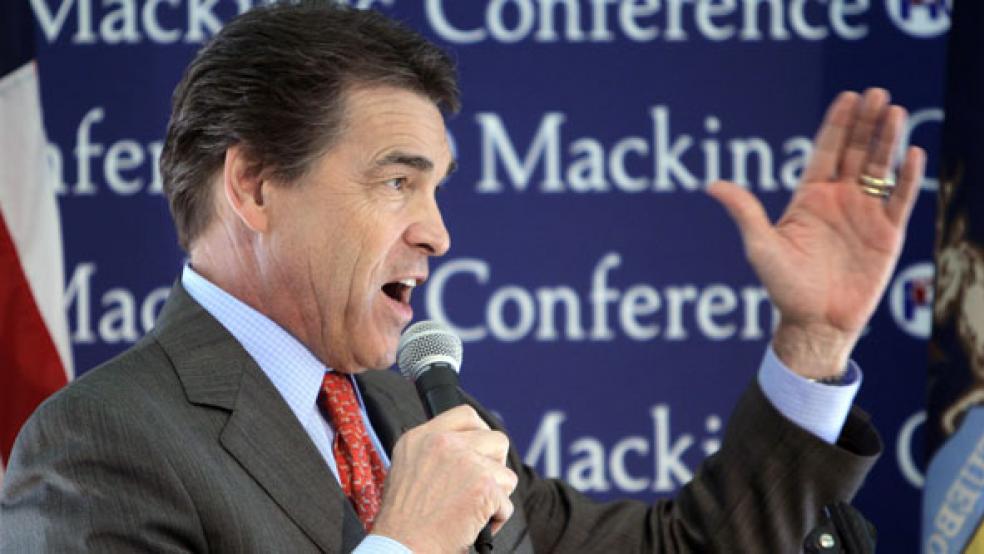In a speech meant to focus on immigration on Thursday, Texas Gov. Rick Perry veered sharply into the arena of foreign policy, calling for a more aggressive U.S. response to ISIS, the Islamic fundamentalist group that has taken over large parts of Iraq and Syria and is responsible for the brutal beheading of American journalist James Foley.
The speech was a blunt departure for Perry, who faces abuse of power charges in his home state, potentially weakening him as a GOP contender in the 2016 presidential race should he decide to enter it.
Related: James Foley Did Not Die in Vain
The Obama administration has, to this point, engaged ISIS with limited airstrikes that have helped Kurdish and Iraqi forces retake the strategically vital Mosul Dam. The airstrikes have also helped save many thousands of members of the Yazidi sect, who were threatened with genocide at the hands of ISIS fighters.
Perry argued, however, that this has not been enough. “When they talk about limited airstrikes, they place a great emphasis on the word ‘limited,’” he said at the Heritage Foundation. “Yet clearly, more airstrikes are necessary. Nothing less than a sustained air campaign to degrade and destroy ISIS forces is required. The Iraqi people are up against a terrorist Blitzkrieg that went practically unhindered for many weeks. Even though these killers have seen glimpses of our superior power and technology, they need to see a lot more of it.”
He made clear that he believes increased support for Iraq means more boots on the ground in a country many Americans hoped the U.S. military was done protecting. “Air power is a major part of it, but it’s also going to take more special operations, intelligence, and advisor support than we’ve offered so far,” Perry said.
Related: Reporter’s Execution Could Unleash U.S. Against ISIS
Perry, who is widely expected to run for the Republican presidential nomination in 2016, began his remarks in a tone that evoked a campaign rally, lashing out at President Obama and his supporters.
He began by discussing the crisis on the Southern border, where tens of thousands of unaccompanied minors have crossed into the U.S. in the past year seeking asylum. But he quickly segued into the issue of ISIS by noting that the fighter shown beheading Foley in the group’s video appears to have been an Englishman.
Foley’s death, he said, is a “preview” of what ISIS wants to do in the U.S. And he suggested that ISIS might send its agents across the Southern border unless it is more adequately defended. “How many other jihadists out there are carrying western passports?” he asked. “What missions might ISIS have for them?”
Related: Obama Denounces ISIS without Threatening Specific Action
Calling on lawmakers to put aside their partisan divisions, Perry wrapped himself in the mantle of a statesman for a few moments. “It is tempting to revisit and reargue the old decisions that have already been made,” he said, before suggesting that such discussions have no place in the current deliberations about how to respond to ISIS.
The mantle then slipped – as Perry immediately went on to enumerate the mistakes he believes the president has made in the Middle East, but he hoisted it up once again, saying, “Just now, however, these, and other questions, I’ll suggest they need to wait for another day. We can talk about all the causes and the contributing factors all day long and it will get us exactly nowhere.”
In response to a question, Perry confirmed that he believes ISIS is already considering the Southern border as a route for attackers to enter the U.S., adding, “There is great concern that the border between the United States and Mexico is unsecure and we don’t know who is using it.”
Last week Perry was indicted by a local prosecutor for abuse of power, and he addressed the controversial case in his opening remarks. He had pressured the Travis County prosecutor to resign after she was jailed for drunken driving, and when she declined, he vetoed part of the funding for her office. Many observers from both sides of the Republican-Democratic divide have dismissed the indictment as political revenge.
Perry said he is “very confident” he will be exonerated. He said the veto was consistent with his powers under Texas statutes, adding, “I intend to defend our constitution and stand up for the rule of law.”
Top Reads from The Fiscal Times:
- Ferguson Unrest Prompts a Cop’s Blunt Op-Ed
- Why Employers Are to Blame for the “Skills Gap”
- 30 Percent of “Retirees” Would Return to the Labor Force





